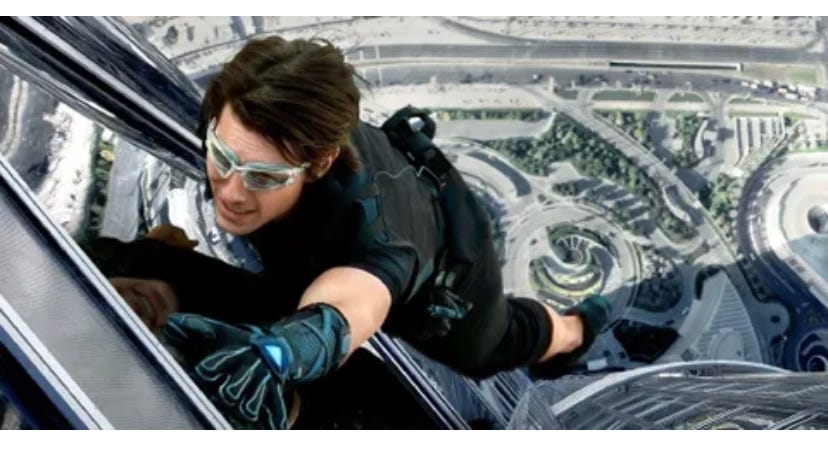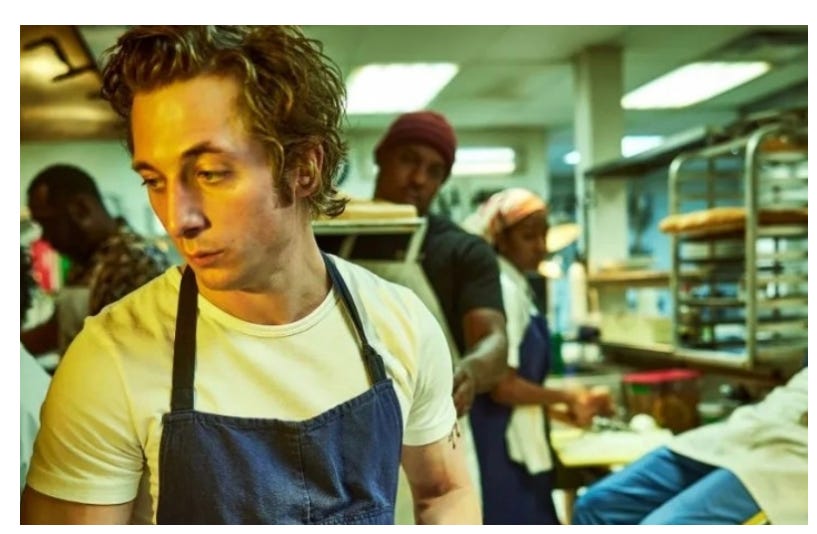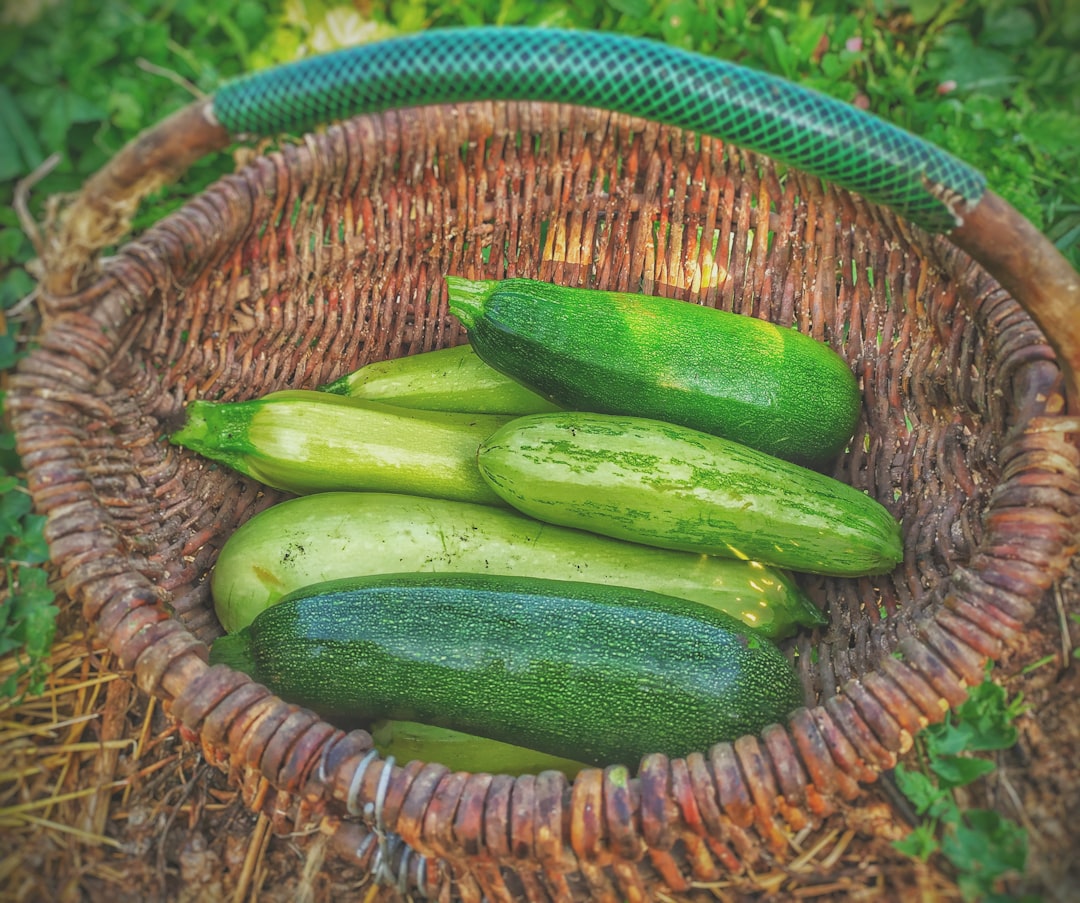You may be wondering what could possibly connect the highbrow Hulu series The Bear and the blockbuster movie Mission Impossible: Dead Reckoning Part 1. On the surface they are not at all alike! I mean, one of them features a short, overly intense perfectionist who chooses to accept an apparently impossible mission and heads up a ragtag team of skilled outcasts. And the other one stars Tom Cruise.

Aristeia, Beckett, and Foucault in The Bear
For those readers who haven’t seen The Bear, here is a brief plot summary (there are some mild spoilers below, but season two has been out since May, so surely the statute of limitations for spoilers has expired by now). The eponymous hero, Carmy “Bear” Berzatto (Jeremy Allen White), is a Michelin-star chef who has won numerous awards, graced numerous magazine covers, worked in numerous top restaurants—and also has a face straight out of a Botticelli painting:

Carmy returns to his home in Chicago because his older brother has died by suicide and willed his financially-troubled greasy-spoon restaurant, Chicago Beef, to Carmy. With the help of Sydney (Ayo Edebiri), a young, talented, and ambitious chef, Carmy decides to turn Chicago Beef around and make it a success. At the end of the first season, Carmy and Sydney take on the seemingly impossible challenge of creating a Michelin-star restaurant. Unfortunately, Carmy has also inherited some intransigent Beef employees, especially Cousin Richie (Ebon Moss-Bachrach) and Tina (Liza Colón-Zayas), who are accustomed to the Beef’s stressful, chaotic kitchen and resist Carmy and Sydney’s changes.
Carmy is also coping with grief and the unresolved trauma of growing up in a family plagued by mental illness and addiction. That’s why there is so much yelling, anger, and chaos in The Bear. It’s what the troubled characters grew up with and feel compelled to repeat in their own lives. But the hopeful message of The Bear is that we can interrupt the dysfunctional cycle, through discipline and skill at work. The show dramatizes the importance of bosses who support their workers, encourage them to improve, and maybe even give troubled souls a second chance.1
Aristeia, a term from Greek epic poetry, refers to the moment of each character’s greatest performance in battle.2 The second season of The Bear contains several examples of aristeia, albeit with kitchen tools instead of spears and arrows, in which individual characters discover their talents and perfect their skills. These moments are possible because the bosses recognize their workers’ potential and give them opportunities to develop it. For example, Sydney asks Tina to be her sous chef and sends her to cooking school. As Tina’s technique and knife skills improve, we see her growing confidence and competence. At the end of her training, Carmy rewards her with her own chef’s knife.
Similarly, Carmy sends Richie, a volatile character whose (sometimes literal) explosions have been a destructive force in the past, for a week’s training in another restaurant. Richie’s mentor puts him to work polishing forks until they gleam. What begins as a senseless, repetitive task becomes a form of meditation—a spiritual practice to help Richie control his emotions. Because Carmy expects the best from him, Richie learns to stop slacking off and to take pride in his accomplishments. Even better, Richie learns to channel his wild energy and charisma away from conflict and toward welcoming the restaurant’s guests.
A second message of The Bear could be summed up by the famous quote from Samuel Beckett: “Ever tried. Ever failed. No matter. Try again. Fail again. Fail better.” Sydney struggles to develop a new menu, and she keeps producing dishes that are not quite right. She and Carmy taste the food, grimace, and spit it out in disgust, over and over again. (Which makes me laugh, because I’m sure that we viewers, with our less-refined palates, would have found the food delicious.) But neither character is deterred by these failures, because they understand that a healthy workplace will allow and even encourage people to fail, fail again, and fail better.
Another character, Marcus (Lionel Boyce), is the lone Beef employee who is dedicated and enterprising from day one. Through his training with a master pastry chef, Marcus learns two important lessons: That it’s ok to make mistakes, and that while not everyone can be the best, everyone can become better by learning from the best. As Marcus notes, there is only one Michael Jordan, but Scottie Pippen was a Hall of Famer too.
Finally, with apologies to Michel Foucault, discipline does not require punishment. Throughout season one, Carmy suffers from traumatic flashbacks to his abusive training in top kitchens. We see a cruel head chef berating, belittling, and raging at his staff over minuscule missteps and imperfections. Carmy refuses to continue the cycle of abuse, whether inflicted by his family or by high-end chefs. Instead of scolding, censuring, or firing his workers for minor (or major) errors, he shows self-discipline and calmly challenges them to try again.
Tom Cruise Is the Antidote to Sprezzatura
There is no need to provide a plot summary of the latest Mission: Impossible, because the movies’ plots are all basically the same. What makes each one unique are the stunts. We could even give the movies such Friends-style titles as The One Where Tom Cruise Climbs the Burj Khalifa (Ghost Protocol); The One Where Tom Cruise Falls Out of a Helicopter, Climbs Back in, and Then Proceeds to Pilot It through a Corkscrew Dive (Fallout); The One Where Tom Cruise Holds His Breath for Six Minutes Underwater (Rogue Nation); and so forth. (Here is a fun article about these stunts.) These stunts, and Cruise’s extensive and public preparation for them,3 are the main reason I am an unapologetic fan. He is the cure for our culture’s pernicious desire for sprezzatura.
“Sprezzatura” first appeared in 1528 in Castiglione’s The Book of the Courtier and means “nonchalance” or “effortlessness.” When we are under the spell of sprezzatura, we want to be cool and to seem masterful, as though we could perform extraordinary feats naturally, through sheer force of talent, without having to do any work at all. It is easy to believe sprezzatura’s lie, because we usually see only the finished product—the slam dunk, the high dive, the flawless concerto, the hit song, the bestselling novel, the deadly stunt—and never the hours and years of planning, practice, and perseverance required for these achievements. The danger is that when we conceal this necessary labor, we make it easier to believe that people who work hard are doing so because they lack talent. And no one wants to seem untalented! But in fact exactly the opposite is true: The most talented people tend to be the least willing to coast on their abilities and the most driven to work the hardest.
When I was a teacher, I lamented the destructive effects of sprezzatura on my students, some of whom assumed that they ought to be able to churn out perfect first drafts with no need for revision, and that if they ran into trouble, it was because there was something wrong with them. Of course it is normal to wish we could be a Milton or a Mozart and able to compose flawless verse paragraphs or musical passages in our heads. But Milton and Mozart were unique geniuses and hardly reasonable models for us mere mortals. When we suppress stories of the hard work necessary to accomplish worthwhile goals, we give young people an excuse to give up when they encounter the inevitable obstacles.
Cruise, by contrast, refuses to hide the effort that goes into his stunts, and this is why he is such an important antidote to sprezzatura. For every Mission: Impossible movie, he and the producers release a video that documents the planning, expertise, and testing by Cruise and his team—all the work that is required to perform these stunts as safely as possible. Crucially, the videos feature not just Cruise but also the construction workers who build the ramps and other equipment for the stunts, the cinematographers and technicians who design the cameras and figure out their placement, the experts who train Cruise and practice with him, and the filmmakers who write and direct the movies and help Cruise carry out his crazy schemes.
The video below gives the backstory to the stunt in Dead Reckoning, in which Cruise drives a motorcycle off a mountain. Cruise shows us that to prepare for the stunt, he did more than 500 skydives and 13,000 (!) motocross jumps. He quips, “I always wear my earplugs . . . so I don’t hear myself scream.” And he thanks the workers! So wholesome! Some commenters have griped that the video about the stunt came out several weeks before the film. But the whole point is that the process is more important than the product. We see Mission: Impossible films for the stunts, and the YouTube videos are an honest and transparent demonstration of the work, and the workers, that are necessary for the stunts’ existence.
How about you, readers? Are you a fan of The Bear and/or of Tom Cruise? What is your favorite series or movie that celebrates workers? Please share your thoughts in the comments!
The Tidbit
Last week I mentioned that this time of year, neighbors give each other their extra tomatoes. But the real problem crop isn’t tomatoes, which everyone loves. It’s zucchini. Does anyone actually like zucchini? Why do they grow to be so huge anyway? Seems excessive.
I learned the hard way that neighbors don’t always appreciate it when you dump your surplus zucchini on them. We moved to a town in New Jersey right after 9/11. Our house came with a garden that contained an inordinate number of oversized zucchini. So I left bags of zucchini at our new neighbors’ front doors. One neighbor, who was perhaps on a bit of a hair-trigger, thought our anonymous zucchini gift was a bomb!4 She was scared to even open the bag and made her husband throw it away down the street. Oops.

A better way to get rid of zucchini is to make zucchini bread. “Bread” is a euphemism, of course, because zucchini bread is really just pound cake, with zucchini substituted for the milk. Anyway, here is my recipe:
Zucchini Spice Cake
Ingredients
1 medium-sized zucchini (i.e., smaller than an unexploded German bomb)
1c each sugar and vegetable oil
2 large eggs at room temperature
1tsp vanilla
zest from one orange and one lemon
2c flour
2tsp baking powder
1tsp cinnamon
1/2tsp each salt, ground ginger, and cloves
1/4tsp nutmeg
2T unsalted butter and extra flour for the loaf pan
Method
Cut off the stem and flower ends of the zucchini and, using a food processor or a grater, coarsely grate it. Spread the grated zucchini evenly on a double layer of paper towels, cover with another double layer of paper towels, and roll up the zucchini, pressing out as much liquid as possible.
In a large mixing bowl, beat the sugar, oil, eggs, vanilla, and zest together. If you don’t feel like dragging out your electric mixer, no worries—this cake will be fine if you mix the batter by hand.
In a small mixing bowl, blend the dry ingredients.
Beginning with the dry ingredients, alternate adding the dry ingredients and the zucchini to the sugar mixture, stirring after each addition just to blend. (I usually do five additions in total.)
Pour batter into a generously buttered and floured loaf pan and bake at 350F/175C for an hour, or until a knife inserted in the center comes out clean. Cool in pan for ten minutes and then remove from pan and cool on a rack before slicing.
All of this is not to say that things are always hunky-dory between labor and management, chez Chicago Beef. Near the end of season one, Sydney accidentally-on-purpose stabs Richie in the butt. Granted, Richie can be aggravating, but bosses, take heed: Do NOT stab your workers!
When I read the Iliad as a college freshman, I developed a huge crush on Diomedes after reading books 5 and 6, which chronicle his aristeia. Yes, I am a total nerd.
Another example of a film that is about not only an achievement, but also the effort that goes into it, is Free Solo, a documentary about Alex Honnold’s climb up El Capitan without a rope. Only a tiny portion of the film deals with the climb itself; the rest is about the planning and practice leading up to the climb.
She is not alone. A few years ago a British man called the police because he found what he thought was an unexploded German bomb in his garden, which turned out to be an enormous (eleven pounds!) zucchini.




Really enjoyed this article. I’m a fan of The Bear, Cruise, and the messages you wrote about each. Thank you.
I love this column in support of labor. The writers' and actors' strike and all the nurses striking and university grad students, faculty and staff organizing show a welcome pushback against the idea that ordinary labor doesn't need to be supported by management or well compensated. There would be no Hollywood stories, or patient care, or teaching and research done if people, aka employees, didn't make it happen. THE BEAR is on my list. Now I'm even more excited to start it.